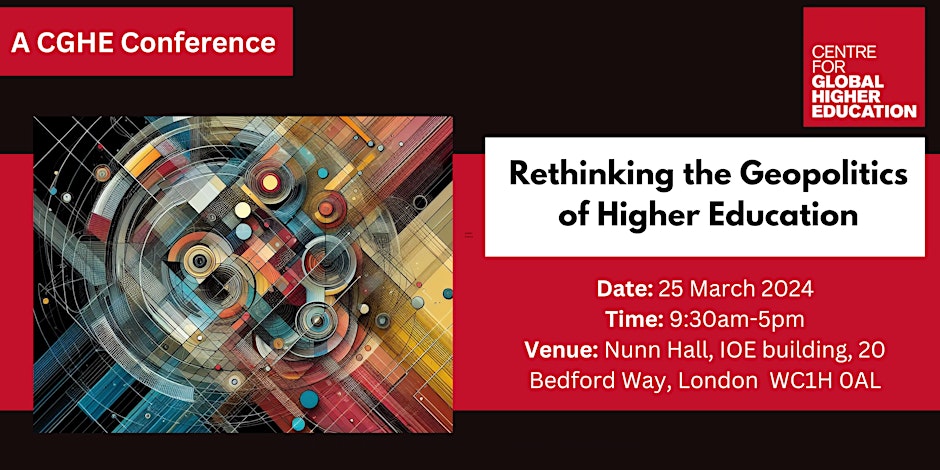Rethinking The Geopolitics Of Higher Education
Presenters:
Ahmet Yirmibes (Bartin University, Türkiye) “EU’s Erasmus ICM Policy: A Global Diffusion of Practices in Higher Education?”
Odhran Fox (Ulster University, UK) “Rolling Out the Turing Scheme: Evaluating the geopolitics and practicalities of a domestic international student mobility scheme”
Andreas Vasilopoulos and Georgios Dourgkounas (University of Patras, Greece) “Capacity Building not: Internationalisation of Higher Education in Greece”
Vera Spangler (University of Surrey, UK) “International higher education in the UK, Denmark, and Germany”
Anne Corbett (London School of Economics and Political Science, UK)
Hannah Moscovitz (Aarhus University, Denmark / University of Cambridge, UK) “Conceptualising the new geopolitics of higher education: Creating a framework for change under conditions of geopolitical uncertainty”
Tessa Celine DeLaquil (Aarhus University, Denmark) “Theorising value capture of ideas of the university in international organisational policy discourse within the SAIOS framework”
Jonah M. Otto (University of Augsburg, Germany) “Theoretical Considerations for Building Strategic Transnational Partnerships in Higher Education within a Dynamic Geopolitical Environment”
Carolina Guzman Valenzuela (Universidad de Tarapacá, Chile) “Partnership Dynamics and Publication Practices: A Critical Inquiry into Latin America’s International Collaboration”
Rebecca Schendel (Center for International Higher Education, Boston College, USA)
Haolin Zhang (University of Glasgow, UK) “Can we cross the border or are we blocked by invisible boundaries?: Impact of new UK immigrant policies on international students in higher education sectors”
Yiran Ma (University of Oxford, UK) “Shaping Ecological Research Cultures for Sino-US Humanities and Social Sciences International Research Collaboration: ‘Chinese-characteristic’ knowledge diplomacy in geopolitical negotiations”
Yamin (University of Birmingham, UK) “The Influence of Geopolitics on Cross-Regional Higher Education in Bangladesh and Myanmar”
Jonathan Williams (Centre for Higher Education and Science Studies (DZHW), Germany) “The African Centers of Excellence Programs – Using regional approaches to produce globally competitive and locally relevant science”
Miguel Antonio Lim, Heather Cockayne, and Zhuo Sun (University of Manchester, UK) “A New ‘Ideal’ for Education Partnerships between China and the world? An analysis of Sino-European transnational HE after the COVID 19 pandemic”
Qiyu Zhuang (University of Edinburgh, UK) “Negotiating Cultural, Political, and Ideological Boundaries: Local Chinese Universities as Both Regional and International Higher Education Space”
Jack Lee (University of Glasgow, UK) “International Student Mobility and Geopolitics: The Case of Taiwan”
Julie Lin, Yi-Chuan Chiu, Ting-Syuan Jhang, and Douglas Pea (University of Oxford, UK) “Soft power building strategy from 2010 to 2020: case of China and Taiwan”
Pauline Essah (Education Sub Saharan Africa ESSA)
Anatoly Oleksiyenko (The Education University of Hong Kong, Hong Kong) “Reconceptualizing Regional Geopolitics in Global Higher Education: The East-West Intersections of Higher Learning in the Context of the Ukrainian Crisis”
Abbas Abbasov (ADA University, Azerbaijan) “Placing the faith in sectoral actors: Systemic higher education governance during the Covid-19 pandemic”
Ahmad Akkad (University of Oxford, UK) “From empowering individuals to enriching societies: Unpacking the potential of international higher education experiences in MENA’s developmental landscape”
Fariba Soetan (The Association of Commonwealth Universities)

Scholarship on the geopolitics of higher education (HE) explores how national HE sectors and individual HE institutions are both subject to, and actors within, geopolitical dynamics. In large part this is because these institutions are ‘deeply embedded in the social fabric of individual states’ and yet also play significant roles globally, making them part of a new geopolitical landscape (Moscowitz and Sabzalieva, 2023, p.150). Research shows how HE actors have been used by national governments to exert geopolitical influence (e.g. Gallarotti, 2022), but also exert geopolitical influence of their own. Examples include French and American missionary universities (e.g. Bertelsen 2020), global rankings (Shahjahan and Morgan, 2016) and European university alliances (Marques and Graf 2023).
This conference builds on the extant literature to rethink the relationship between higher education and geopolitics in relation to three specific themes:
1. Capacity building? Many initiatives in higher education are intended to build not only the institutional ‘capacity’ of universities, but also to promote economic and social capacity locally, nationally, regionally, and sometimes internationally. We will draw on specific examples (e.g. the provision of scholarships and training) to consider the efficacy of such initiatives and the ways in which they are informed by, but can also serve to shape, geopolitical relationships.
2. Partnerships? We will explore collaborative partnerships between a variety of different actors including higher education institutions, national governments, regional bodies, national and international funding agencies, international organisations and private sector bodies. We will consider the power dynamics embedded in such relationships, and the extent to which they bring about change, and/or serve to reinscribe existing inequalities.
3. Conceptualising (cross-)regional spaces. We will examine the nature of particular regional higher education spaces (e.g. the European Higher Education Area, Eurasian, Central Asian), the spatial imaginaries that are brought into play in relation to these, and how regional borders and boundaries are established and maintained. We will also discuss the geopolitics entangled in cross-regional higher education spaces and flows, such as Africa-China academic mobilities.
The conference is organised as part of the ESRC-funded Centre for Global Higher Education (CGHE), by Tristan McCowan and Lee Rensimer (UCL), Maia Chankseliani and David Mills (University of Oxford) and Rachel Brooks (University of Surrey). The event will include contributions from their CGHE-funded research on the geopolitics of supranational higher education.
9.30am -10am
Welcome remarks, aims of symposium, and overview of themes
Rachel Brooks (University of Surrey, UK)
Maia Chankseliani (University of Oxford, UK)
Tristan McCowan (University College London, UK)
David Mills (University of Oxford, UK)
Lee Rensimer (University College London, UK)
10am – 11.20am
Session 1: The geopolitics of internationalisation in the European higher education space
Chair: Rachel Brooks (University of Surrey, UK)
Ahmet Yirmibes (Bartin University, Türkiye)
“EU’s Erasmus ICM Policy: A Global Diffusion of Practices in Higher Education?”
View presentation slides
Odhran Fox (Ulster University, UK)
“Rolling Out the Turing Scheme: Evaluating the geopolitics and practicalities of a domestic international student mobility scheme”
View presentation slides
Andreas Vasilopoulos and Georgios Dourgkounas (University of Patras, Greece)
“Capacity Building not: Internationalisation of Higher Education in Greece”
View presentation slides
Vera Spangler (University of Surrey, UK)
“International higher education in the UK, Denmark, and Germany”
View presentation slides
Discussant: Anne Corbett (London School of Economics and Political Science, UK)
11.40am – 1pm
Session 2: Thinking through the geopolitics of HE: frameworks, approaches, and challenges
Chair: Lee Rensimer (University College London, UK)
Hannah Moscovitz (Aarhus University, Denmark / University of Cambridge, UK)
“Conceptualising the new geopolitics of higher education: Creating a framework for change under conditions of geopolitical uncertainty”
Tessa Celine DeLaquil (Aarhus University, Denmark)
“Theorising value capture of ideas of the university in international organisational policy discourse within the SAIOS framework”
View presentation slides
Jonah M. Otto (University of Augsburg, Germany)
“Theoretical Considerations for Building Strategic Transnational Partnerships in Higher Education within a Dynamic Geopolitical Environment”
View presentation slides
Carolina Guzman Valenzuela (Universidad de Tarapacá, Chile)
“Partnership Dynamics and Publication Practices: A Critical Inquiry into Latin America’s International Collaboration”
View presentation slides
Discussant: Rebecca Schendel (Center for International Higher Education, Boston College, USA)
1pm – 2pm
Poster presentations
Haolin Zhang (University of Glasgow, UK)
“Can we cross the border or are we blocked by invisible boundaries?: Impact of new UK immigrant policies on international students in higher education sectors”
View poster presentation
Yiran Ma (University of Oxford, UK)
“Shaping Ecological Research Cultures for Sino-US Humanities and Social Sciences International Research Collaboration: ‘Chinese-characteristic’ knowledge diplomacy in geopolitical negotiations”
View poster presentation
Yamin (University of Birmingham, UK)
“The Influence of Geopolitics on Cross-Regional Higher Education in Bangladesh and Myanmar”
View poster presentation
2pm – 3.20pm
Session 3: Academic mobility, capacity and partnerships: China and Africa in comparative perspective
Chair: David Mills (University of Oxford, UK)
Jonathan Williams (Centre for Higher Education and Science Studies (DZHW), Germany)
“The African Centers of Excellence Programs – Using regional approaches to produce globally competitive and locally relevant science”
View presentation slides
Miguel Antonio Lim, Heather Cockayne, and Zhuo Sun (University of Manchester, UK)
“A New ‘Ideal’ for Education Partnerships between China and the world? An analysis of Sino-European transnational HE after the COVID 19 pandemic”
View presentation slides
Qiyu Zhuang (University of Edinburgh, UK)
“Negotiating Cultural, Political, and Ideological Boundaries: Local Chinese Universities as Both Regional and International Higher Education Space”
View presentation slides
Jack Lee (University of Glasgow, UK)
“International Student Mobility and Geopolitics: The Case of Taiwan”
View presentation slides
Julie Lin, Yi-Chuan Chiu, Ting-Syuan Jhang, and Douglas Pea (University of Oxford, UK)
“Soft power building strategy from 2010 to 2020: case of China and Taiwan”
View presentation slides
Discussant: Pauline Essah (Education Sub Saharan Africa (ESSA))
3.40pm – 5pm
Session 4: Higher education partnerships in times of crises
Chair: Maia Chankseliani (University of Oxford, UK)
Anatoly Oleksiyenko (The Education University of Hong Kong, Hong Kong)
“Reconceptualizing Regional Geopolitics in Global Higher Education: The East-West Intersections of Higher Learning in the Context of the Ukrainian Crisis”
View presentation slides
Abbas Abbasov (ADA University, Azerbaijan)
“Placing the faith in sectoral actors: Systemic higher education governance during the Covid19 pandemic”
View presentation slides
Ahmad Akkad (University of Oxford, UK)
“From empowering individuals to enriching societies: Unpacking the potential of international higher education experiences in MENA’s developmental landscape”
Discussant: Fariba Soetan (The Association of Commonwealth Universities)
5pm
Closing remarks
Tristan McCowan (University College London, UK)
Event Notes
Please find the General Privacy Policy of UCL, one of our partner universities, here: https://www.ucl.ac.uk/legal-services/privacy/general-privacy-notice


